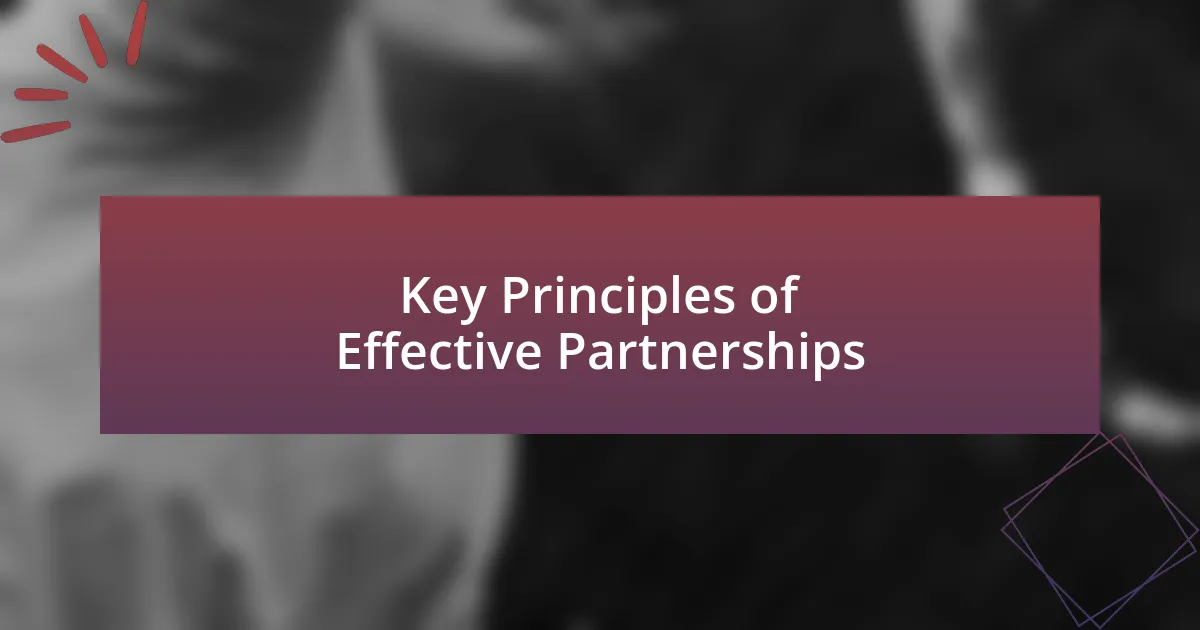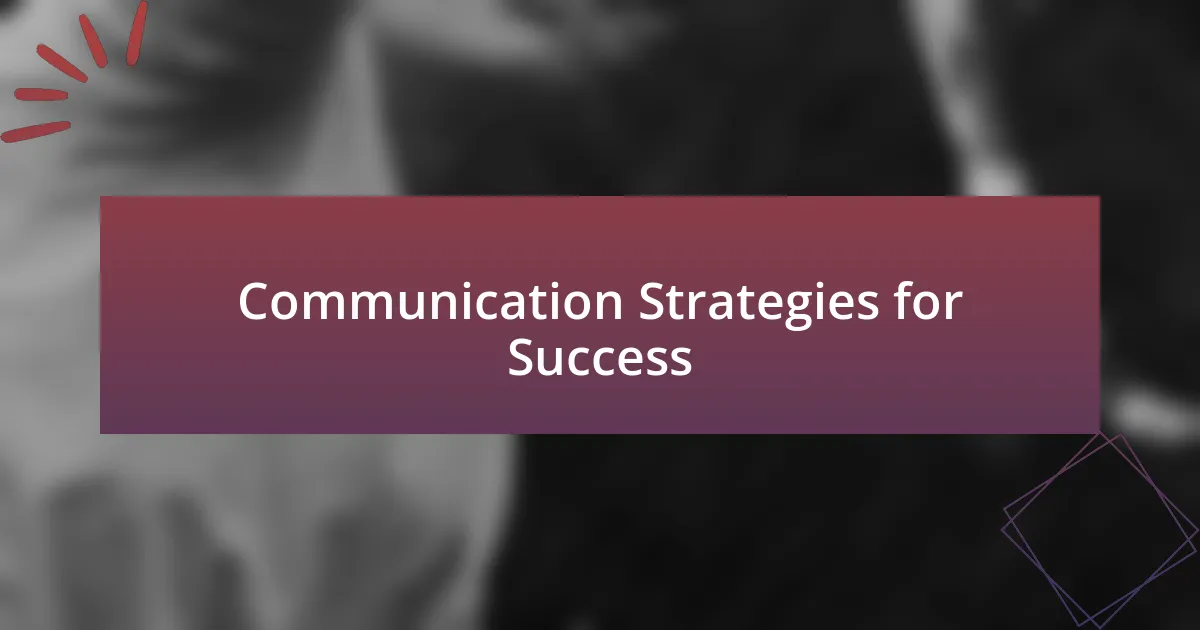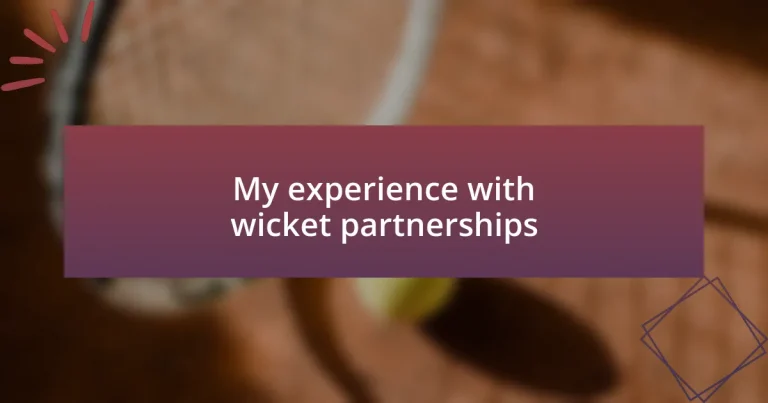Key takeaways:
- Effective communication and trust are essential for successful wicket partnerships, allowing players to navigate challenges and adapt strategies seamlessly.
- Partnerships thrive on complementary skills, emotional resilience, and shared goals, fostering an environment of collaboration and support.
- Measuring success in partnerships should focus on personal growth and mutual development, rather than solely on winning.
- Celebrating small victories can enhance motivation and strengthen the bond between partners, reinforcing their commitment to each other.

Understanding Wicket Partnerships
Understanding wicket partnerships is crucial for appreciating the dynamics of cricket. I still remember a match where a pair of batsmen, each with a unique style, began to gel beautifully. As their understanding deepened, I felt the tension in the air shift; it was a palpable energy that only comes when things click on the field.
Have you ever watched a team that transformed their performance through sheer collaboration? In my experience, partnerships flourish when players communicate—sometimes with just a glance. A memorable match for me was when two batsmen were able to complement each other’s strengths and exploit the bowler’s weaknesses, creating scoring opportunities that seemed almost effortless.
It’s fascinating how wicket partnerships can dictate the course of a game. I’ve seen partnerships that break records and those that simply grind out runs under immense pressure. I often wonder, what makes certain partnerships succeed? In many cases, it’s the blend of patience, strategy, and the emotional bond that forms between teammates, turning individual talent into a formidable force on the field.

Key Principles of Effective Partnerships
Effective partnerships in cricket hinge on a few key principles that can make all the difference. I’ve witnessed how trust between teammates fosters an atmosphere where unconventional strategies can thrive. In one particular match, I saw two players, initially hesitant, gradually gain confidence in each other’s abilities. Their trust transformed their approach, allowing them to take calculated risks that paid off with significant runs.
Here are some essential principles that underlie successful partnerships:
- Communication: Open dialogue instills confidence and ensures that both players are on the same page.
- Complementary Skills: Knowing each other’s strengths and weaknesses can lead to strategic scoring opportunities.
- Adaptability: The ability to adjust to changing game dynamics is crucial for maintaining the partnership’s effectiveness.
- Emotional Resilience: Building a strong emotional bond helps players support one another during tough phases of the game.
- Shared Goals: Aligning on objectives, whether short-term or long-term, solidifies teamwork and enhances focus.
Drawing from these principles, it’s clear that partnerships thrive in an environment rich with connection and mutual respect.

Building Trust in Partnerships
Building trust in partnerships is essential for achieving success, both on and off the field. I remember a time when a partner and I had to work through a challenging situation during a high-stakes match. Initially, I questioned my partner’s decision-making. However, as we discussed our strategy openly, I began to see their perspective. This dialogue not only eased my concerns but also reinforced our commitment to each other, ultimately leading to a fruitful partnership that day.
Trust is built through consistent actions and shared experiences. In one memorable game, my partner and I faced a tough bowling attack. I was nervous, but my partner encouraged me with a reassuring smile and a few kind words. That little moment made all the difference—it was a reminder that we were in this together. The confidence I gained from that trust allowed us to focus on our game rather than our doubts, resulting in a strong performance.
What I’ve learned is that trust isn’t earned overnight; it’s cultivated through patience and understanding. When both players believe in each other’s capabilities and intentions, it creates a supportive environment that can weather any storm. Reflecting on my experiences, I find that the heart of a successful partnership lies in these moments of connection and trust-building.
| Trust Indicator | Example in Partnerships |
|---|---|
| Open Communication | Discussing strategies and concerns regularly |
| Reliability | Consistently performing to the best of your ability |
| Emotional Support | Providing encouragement during tough phases |

Communication Strategies for Success
Clear communication is a cornerstone of any successful partnership, and I can’t emphasize this enough. There was a time when my partner and I played in a crucial tournament, but we faced miscommunication about our roles. Mid-game, I spotted my partner positioned for a shot that I didn’t expect them to take. Instead of panicking, we quickly exchanged a few words, recalibrating our strategy on the fly. This adaptability not only allowed us to regain focus but also prevented potential errors that could have cost us the match.
I’ve realized, too, that active listening plays a vital role in fostering effective communication. Once, during a practice session, my partner suggested a different approach to drilling. At first, I hesitated, thinking my own method was superior. However, I paused to truly hear and understand their reasoning. When I tried their technique, it unexpectedly enhanced my performance. It was a powerful reminder that being open to others’ input can yield surprising benefits.
Moreover, it’s essential to create an environment where both partners feel safe to express their thoughts. I remember a time when after a loss, we sat together and candidly talked about our feelings and frustrations over the game. This honest conversation not only strengthened our bond but also highlighted areas we could improve. It made me wonder—how often do we allow vulnerability to guide our discussions? Embracing that openness can transform setbacks into stepping stones for success.

Navigating Challenges in Partnerships
Navigating challenges in partnerships often requires a blend of patience and empathy. I recall a moment when my partner and I faced a particularly tough opponent who had a knack for exploiting our weaknesses. In the heat of the match, I noticed my partner becoming frustrated. Instead of letting that spiral out of control, I took a deep breath and reminded them of our strengths. We need to support each other rather than dwell on mistakes, which shifted our dynamic positively.
Whenever conflicts arise, I always try to remember the bigger picture. One time, during a heated discussion about our game strategy, I realized we were fixating on minor details that didn’t truly matter. I paused the conversation and asked, “What do we really want to achieve together?” That question helped us realign our goals and prioritize what was most important—our growth as a team. It’s interesting how stepping back to reassess can illuminate paths forward that had been obscured by frustration.
Sometimes, external factors can complicate partnerships, too. I experienced this firsthand when unexpected life events interrupted our training schedule. Instead of succumbing to disappointment, I suggested we adapt our routines. We turned those challenges into opportunities for creativity, finding new ways to connect and train together. Have you faced similar disruptions? I believe how we choose to respond can often define the strength of our partnership.

Measuring Success in Partnerships
Measuring success in partnerships can often feel elusive, but I’ve found that establishing clear, shared goals helps. I remember setting specific performance benchmarks with my partner before a major tournament. It was exhilarating to track our progress together, and each small victory reinforced our commitment to one another. What metrics have you considered important in your own partnerships?
Another approach involves celebrating the moments of growth that extend beyond mere statistics. I always emphasize the importance of communication and trust, and I’ve seen firsthand how nurturing these elements leads to a deeper connection. For example, after a tough match, instead of just discussing our errors, we reflected on how we navigated challenges as a team. This focus on our emotional journey allowed me to see our partnership as a tapestry woven from both success and struggle.
Lastly, I often remind myself that partnership success isn’t solely about winning; it’s about personal and mutual development. There was a time when we finished a tournament without a medal, but the lessons we learned about resilience and adaptability were the true treasures. How often do we evaluate ourselves based on external validations instead of our inner growth? In my experience, fostering a culture of reflection within the partnership should be as important as tracking our scores.

Lessons Learned from My Experience
I’ve discovered that effective communication is the backbone of any successful partnership. There was a time in a critical match when my partner and I experienced a misunderstanding mid-game, which almost cost us the win. This taught me that being proactive in discussing our strategies and feelings before and during competitions fosters a smoother collaboration. Have you ever noticed how clarity can change the dynamics of teamwork?
Trust is another lesson that stands out from my experiences. Early in my partnerships, I sometimes hesitated to fully lean on my teammate, fearing it might expose my weaknesses. However, I’ve realized that embracing vulnerability and relying on each other can lead to powerful synergy. In one memorable instance, after sharing my concerns, we developed a mutual support system that not only boosted our performance but also our friendship.
Lastly, I learned that celebrating even the smallest wins amplifies motivation within a partnership. One day, after a particularly grueling training session, my partner and I took a moment to appreciate the effort we both put into overcoming a tough drill. That simple acknowledgment transformed our energy, reminding us that every step forward matters. What small victories have you commemorated with your partner?



